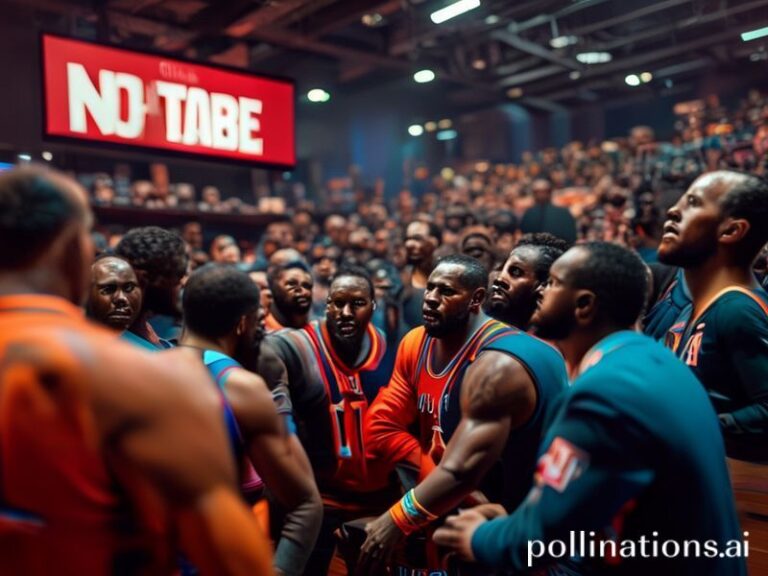EA Play: How a Gaming Subscription Conquered the World One Recurring Payment at a Time
EA Play: The Subscription Service Quietly Colonizing the Planet, One Micro-Transaction at a Time
By our man in the cloud, still buffering in Ulaanbaatar
If you woke up this morning in Lagos, Lima, or Lahore and noticed that FIFA 23 now costs less than a cup of coffee—provided you rent it by the month—you’ve already been touched by EA Play, the little subscription that could… and does… and absolutely will keep doing until your grandchildren speak fluent Ultimate Team.
Electronic Arts’ gaming passport began in 2016 as a humble Xbox perk, but like all American tech exports it soon discovered the addictive sweetness of overseas markets where regulation is rumor and bandwidth is finally cheap enough to drown entire generations in dopamine. Today EA Play is available in 41 currencies, 22 languages, and, if you believe the marketing, “millions of living rooms.” (Corporate euphemisms for “we’ve seen your couch and counted the Cheeto dust.”)
The global rollout is textbook neo-colonialism, Silicon-Valley edition: identify emerging middle classes, parachute in servers, then let local telecoms argue over who gets to bill the peasants. In Brazil, EA partnered with regional giant UOL; in India, Jio Fiber bundles the service the same way Victorian railways once came with free Bibles. The result: from Jakarta to Johannesburg, teenagers who can’t legally vote can still rack up more debt than their parents did during the IMF years, all for the privilege of owning a digital Mbappé that evaporates the moment the subscription lapses.
EA executives call this “democratizing play.” Critics call it “debt with better graphics.” Both sides are correct, which is exactly the kind of moral ambiguity modern journalism was built to swallow dry.
The pandemic, that great accelerator of human screen-time, gifted EA Play a captive planet. Console sales spiked faster than a Russian oligarch’s blood pressure, and EA’s subscriber count quietly doubled to 19 million—roughly the population of Chile, except Chile can’t charge you $4.99 a month for access to its volcanoes. Meanwhile, the company’s net revenue from subscriptions alone topped $2.8 billion last fiscal year, enough to purchase several actual countries whose flags you can probably unlock as a rare badge in Apex Legends.
Of course, no international story is complete without geopolitical irony. EA Play’s cloud servers currently occupy former Soviet data farms in Estonia, meaning today’s Estonian teenagers are literally farming their own grandparents’ abandoned infrastructure so that a kid in Buenos Aires can scream profanities at a stranger in Helsinki over a missed NHL goal. History doesn’t repeat itself, it just emotes.
The service’s genius lies in what economists politely term “the marginal cost of nothing.” Once a game is old enough to drive, EA shovels it into the subscription vault where it can generate infinite pennies instead of gathering digital dust. Consumers feel savvy; shareholders feel orgasmic; the planet feels nothing—except perhaps the gentle hum of coal-fired power grids keeping those Estonian racks on life support. Everyone wins, except the atmosphere, which loses roughly 0.6 grams of CO₂ every time someone boots up Battlefield V just to crash a virtual Zero into a virtual aircraft carrier for the LOLs.
And yet, who can resist? In an era when real-world passports shrink in value faster than the Turkish lira, a global gaming pass feels like the last honest ticket to mobility. You can’t afford Berlin rent, but you can still play “It Takes Two” with a stranger who can’t afford Seoul rent, bonding over shared precarity while both your governments argue over submarine contracts. It’s the closest thing the 21st century has produced to international brotherhood—sponsored by in-game ads for Ford pickups.
EA Play won’t cure cancer, broker Middle-East peace, or keep the oceans from swallowing Bangladesh. It will, however, let you postpone contemplating those inconveniences for the low, low price of a monthly latte, auto-renewing until your credit card expires or civilization does, whichever comes first.
Call it escapism, call it exploitation, call it Tuesday. Just remember: somewhere right now a 12-year-old in Nairobi is trash-talking a dentist from Düsseldorf, both of them renting the same pixelated footballer they will never own, in a world they will never visit, for a fee that never ends.
Welcome to Earth. Please select your payment method.







